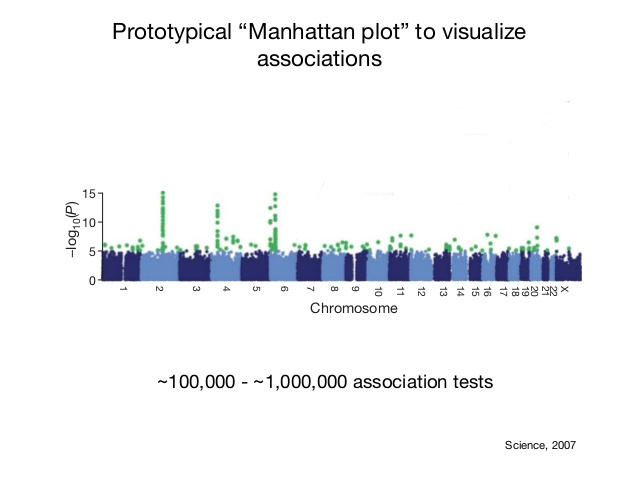Last week @dr_appie stated the current consensus in human genetics that polygenic scores can't be compared between populations. He was met with some bold claims from the race science gang about how linkage disequilibrium doesn't contribute to this problem. Let's dig into this! https://twitter.com/dr_appie/status/1289081054276485122
Why does this matter? Well these scientific racists like to use polygenic scores to show that genetics are the cause of differences in IQ scores between European and African people, even being able to publish such faulty and inadequate studies in peer-reviewed journals.
First let's talk about how Genome-Wide Association studies (GWAS) work. GWAS try to associate DNA base-pair differences between individuals with differences in a trait. The end result is a list of associated regions of the genome & estimates of the size of the effect on the trait
A polygenic score is just when we add all these estimated effects of associated regions into a single value.
It's not tractable to sequence & test every bit of DNA. Luckily, meiotic recombination creates blocks of DNA. Linkage disequilibrium (LD) is when bits of DNA co-occur on these blocks. GWAS exploit LD because we can sequence only some of the genome but LD means we cover most of it
Importantly, we don't expect the bits of DNA we sequence to be the bits that cause differences in a trait, just that what we sequence is in LD with the causal bit and herein lies the problem.
LD isn't the same in all human populations so we may not be catching the causal bits as well in each population Additionally the bits we sequence may be at different frequencies in different populations. Both these issues can result in artificial differences in polygenic scores.
So about that "study" that was linked to @dr_appie. The paper isn't very well written but the claim is that there isn't a relationship between a measure of LD differences between populations and polygenic score differences between populations. There are a few problems here:
1. There's no clear indication this approach can estimate the contribution of LD differences to polygenic score differences. Typically when you try a new approach you demonstrate it works with simulations or exemplar cases. NB: this author has a history of struggling with this
The fact that we don't have any reason to be believe the approach taken can actually perform the intended purpose is a big problem! It's why scientists often spend so much time justifying and validating their methods, especially when they have not been employed before.
2. A published study, Wang et al., uses a more rigorous framework (& demonstrates accuracy with simulations) & found that, for African populations, nearly 86% of differences in polygenic score performance is explained by LD & allele frequency differences https://www.nature.com/articles/s41467-020-17719-y
There are some major differences between these two studies. The above approach provides a mathematical framework that uses population genetic paramters to identify and quantify contributors to polygenic score differences.
Additionally, this published study evaluated LD in a way that should maximize likelihood of measuring LD between a tag variant and a causal variant (left) while Piffer did not (right)
Bolstering Wang et al.'s results, another preprint from @mathiesoniain found largely congruent results on the partial influence of LD and allele frequency differences on polygenic score performance https://www.biorxiv.org/content/10.1101/2020.04.08.030361v2
3. As the preprint above notes, just because LD doesn't explain all of the difference in polygenic score performance doesn't mean polygenic scores are meaningful when compared between populations. Gene-by-environment interactions can & do come into play https://www.biorxiv.org/content/10.1101/2020.07.28.225730v1.full.pdf
It would be very hasty reasoning to argue that lack of LD influence on polygenic score performance means that we can or should uncritically compare polygenic scores across populations even when lack of transferability has been thoroughly documented.
Unsurprisingly the attempts by scientific racists to support their subpar work trying to prove Africans are biologically less intelligent are underwhelming and do not match up with more rigorous and better evidenced results from mainstream researchers.
Generally this kind of thing matches a trend where these researchers attempt to use flashy genomic analyses and the veneer of more rigorous methodology to cover up for questionable and unfounded approaches to curve the study of human differences to their racist prejudice.
Hopefully this thread helped people learn a bit more about the underlying biology to these techniques and how to critically evaluate literature (this is pretty much exactly how I would peer-review this paper, were I reviewing it for a journal)

 Read on Twitter
Read on Twitter




















